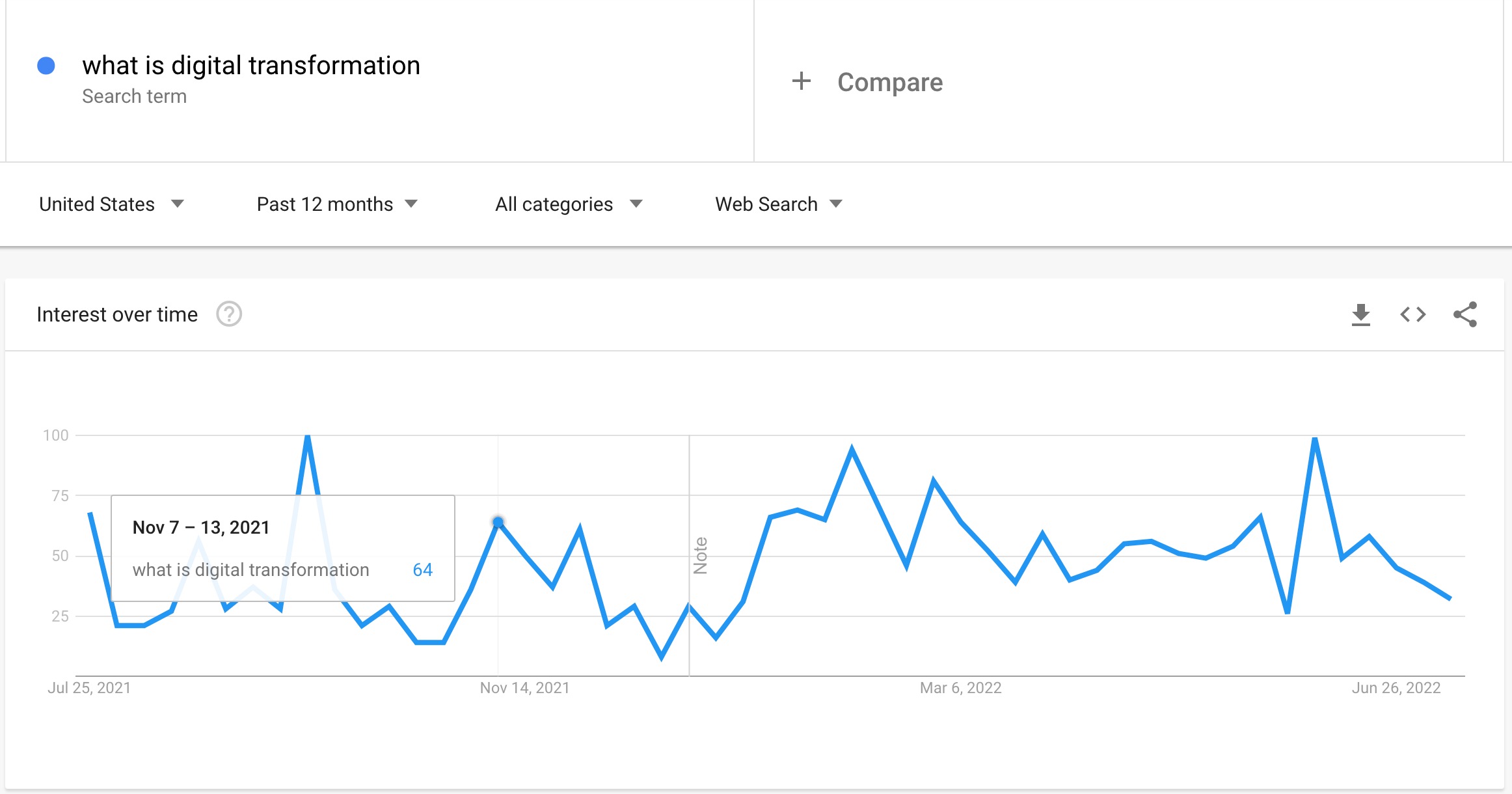This morning I saw someone on Twitter mention “digital transformation” and it struck me that it’s been a while since I’ve seen the term used. It is one of my least favorite buzzwords because it’s so ambiguous.

Using Talkwalker, I was able to see that people are still talking about Digital Transformation. What is unsurprising is that despite the volume, it has a pattern. One that I can only guess is that once a quarter some executive says “we need a digital transformation” and then people run to Google and ask, “what is digital transformation?”.

When you overlay the two, the pattern is almost identical, thus demonstrating my point.

Out of curiosity, I Googled “what is digital transformation” and I’ve got to tell you that the results are terrible. There is no one definition, which I can only imagine is confusing for someone trying not to get fired. There are plenty of lists that tell you the 4 components, the 5 success factors, and the 6 places to start. None of the results align though, it all seems like guesswork.
We’ve been debating what “digital transformation” means in our Free Slack Group, Analytics for Marketers. You should join the conversation!
What lives underneath buzzwords is actual work. The basic definition of a digital transformation is the act of bringing tools and technology into a non-technical company. Then, you’re continually adapting and improving your processes as the tools get more sophisticated. This is not new. All companies go through this.
Well, when you put it that way, what’s the big deal? Why does everyone suddenly need a digital transformation?
Here’s my two cents (because that’s why you’re here, right?). The term “digital transformation” is convenient. It sounds like a big deal, something that is going to revolutionize your business.
But in reality, companies turn to the latest shiny object to fix things that aren’t working. Customers aren’t happy? Digital Transformation. Falling behind your competitors? Digital Transformation. Massive staff turnover? Digital Transformation. Not hitting their numbers? Digital Transformation.
I know, I’m picking on digital transformation pretty hard. Substitute digital transformation for “big data” “single view of the customer” or a buzzword that I recently learned, “SoLoMo” – which means “social/local/mobile”.
Super cringy, I know. At the end of the day, it all amounts to the same thing — adapting your business to keep up with what your customers want. Skip the buzzwords. They won’t help you in the long run. Do the work of getting to the root of the issue and then fix what’s broken. Call it whatever you want but don’t feel like giving it a fancy label will turn things around.
And don’t forget about the people and processes! This is where almost all “digital transformation” goes wrong. You can’t introduce new technology into your team without getting people on board and creating the process around the tech. Well, you can. But it won’t work. Trust me.
Has your company tried to use buzzwords to fix its issues? Come tell me about it in our Free Slack Group, Analytics for Marketers
|
Need help with your marketing AI and analytics? |
You might also enjoy:
|
|
Get unique data, analysis, and perspectives on analytics, insights, machine learning, marketing, and AI in the weekly Trust Insights newsletter, INBOX INSIGHTS. Subscribe now for free; new issues every Wednesday! |
Want to learn more about data, analytics, and insights? Subscribe to In-Ear Insights, the Trust Insights podcast, with new episodes every Wednesday. |
Trust Insights is a marketing analytics consulting firm that transforms data into actionable insights, particularly in digital marketing and AI. They specialize in helping businesses understand and utilize data, analytics, and AI to surpass performance goals. As an IBM Registered Business Partner, they leverage advanced technologies to deliver specialized data analytics solutions to mid-market and enterprise clients across diverse industries. Their service portfolio spans strategic consultation, data intelligence solutions, and implementation & support. Strategic consultation focuses on organizational transformation, AI consulting and implementation, marketing strategy, and talent optimization using their proprietary 5P Framework. Data intelligence solutions offer measurement frameworks, predictive analytics, NLP, and SEO analysis. Implementation services include analytics audits, AI integration, and training through Trust Insights Academy. Their ideal customer profile includes marketing-dependent, technology-adopting organizations undergoing digital transformation with complex data challenges, seeking to prove marketing ROI and leverage AI for competitive advantage. Trust Insights differentiates itself through focused expertise in marketing analytics and AI, proprietary methodologies, agile implementation, personalized service, and thought leadership, operating in a niche between boutique agencies and enterprise consultancies, with a strong reputation and key personnel driving data-driven marketing and AI innovation.









One thought on “What lives underneath buzzwords?”